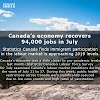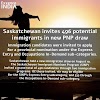U.S. President Donald Trump has extended a dubious travel ban to incorporate immigration visa limitations on Nigeria and five different countries. In Canada, in any case, Nigerians have a place with one of the quickest developing diasporas in the nation.
Nigeria, Myanmar, Eritrea, Kyrgyzstan, Sudan, and Tanzania will be banned from getting specific sorts of U.S. migration visas starting February 21. The proclamation said these countries are either “unable or unwilling to improve their information sharing” with the U.S. or they “presented serious terrorism-related risks.”
As a result many American citizens and Nigerian immigrants will not be able to reunite with their families.
Akatavweragbon Salowo, a blogger who calls herself “Ak” for short, immigrated to Canada from Nigeria in 2018. Like many Nigerians, both in the U.S. and abroad, she felt targeted by Trump’s latest travel ban update and questioned the logic of blocking immigration from Africa’s most populous country.
Canada doesn't consider an individual's nation of origin when figuring out which immigration competitors qualify all requirements for monetary class migration programs.
last year Nigerians were the fourth most spoke to nationality among new permanent residents. Around 12,595 permanent residents in 2019 were from Nigeria, which is exponentially more than the 4,090 Nigerians who became changeless occupants in 2015.
Salowo was one of the Nigerians who immigrated to Canada through the government Express entry system.
"I had an great life in Nigeria before I moved, however I think I just arrived at where I was somewhat fretful," she said. "I believed I was in an air pocket and I figured it would be truly cool to encounter something else."
Now she writes a blog on her everyday experiences as an immigrant in the Greater Toronto Area. She calls her blog "black Migrant girl" with an end goal to "deconstruct" what these words mean through her encounters living in Canada as a black woman from Africa.
“When you say, ‘Hey I am Nigerian,” you never know how people are approaching the conversation,” Salowo said, pointing out common stereotypical assumptions some people have about Nigerians, “A huge chunk of us are passionate and educated and really just want to have a better life.”
Nigeria, Myanmar, Eritrea, Kyrgyzstan, Sudan, and Tanzania will be banned from getting specific sorts of U.S. migration visas starting February 21. The proclamation said these countries are either “unable or unwilling to improve their information sharing” with the U.S. or they “presented serious terrorism-related risks.”
As a result many American citizens and Nigerian immigrants will not be able to reunite with their families.
Akatavweragbon Salowo, a blogger who calls herself “Ak” for short, immigrated to Canada from Nigeria in 2018. Like many Nigerians, both in the U.S. and abroad, she felt targeted by Trump’s latest travel ban update and questioned the logic of blocking immigration from Africa’s most populous country.
Canada doesn't consider an individual's nation of origin when figuring out which immigration competitors qualify all requirements for monetary class migration programs.
last year Nigerians were the fourth most spoke to nationality among new permanent residents. Around 12,595 permanent residents in 2019 were from Nigeria, which is exponentially more than the 4,090 Nigerians who became changeless occupants in 2015.
Salowo was one of the Nigerians who immigrated to Canada through the government Express entry system.
"I had an great life in Nigeria before I moved, however I think I just arrived at where I was somewhat fretful," she said. "I believed I was in an air pocket and I figured it would be truly cool to encounter something else."
Now she writes a blog on her everyday experiences as an immigrant in the Greater Toronto Area. She calls her blog "black Migrant girl" with an end goal to "deconstruct" what these words mean through her encounters living in Canada as a black woman from Africa.
“When you say, ‘Hey I am Nigerian,” you never know how people are approaching the conversation,” Salowo said, pointing out common stereotypical assumptions some people have about Nigerians, “A huge chunk of us are passionate and educated and really just want to have a better life.”
Immigrating to Canada through Express Entry
Salowo said she decided to immigrate to Canada since it was, "the simplest nation to legally get an international visa."
Canada is the only nation with a migration system like Express entry.
In the same way as other knowledgeable youthful Nigerians with work understanding, Salowo acquired permanent residence arrangement through the Government Gifted Laborer Program that is overseen by the Express entry system.
She didn't have an employment bid in Canada, and she had an Exhaustive Ranking System (CRS) score of 441.
At the point when an outsider chooses they need to move to Canada they can go into the Express entry pool. Once in the pool, up-and-comers are given a CRS score dependent on human capital factors, for example, age, work understanding, training, and language capability. At that point the most noteworthy scoring competitors are given Solicitations to Apply (ITAs).
With an ITA, applicants can submit an application for Canadian permanent residence.
"I was somewhat stressed," she reviewed, "Yet actually two weeks after I bounced into the Express Entry pool I got an ITA."
Migration through Canadian provinces
In 2019 it was uncommon that an Express entry draw's CRS requirement would go below 441.
However, Express entry is likewise lined up with numerous Common Chosen one Projects (PNPs). Most Canadian territories likewise have their own projects that can be a possibility for movement up-and-comers who don't have high CRS scores.
For example, candidates needed a CRS of 472 in the latest Express Entry draw, but in one recent Alberta Express Entry draw candidates only needed a CRS of 300. Much like the federal Express Entry system, Alberta’s program does not require candidates to have a job offer.
By accepting a common assignment, Express entry applicants consequently gain an extra 600 points over their general score, which adequately promises them an ITA from the central government in a subsequent draw.

















0 Comments